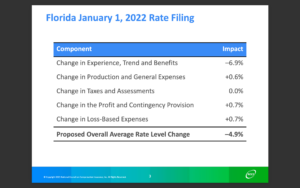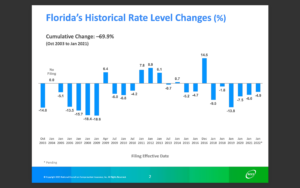Florida workers’ compensation rates are set to decline again as the National Council on Compensation Insurance (NCCI) has proposed a statewide rate decrease of 4.9% in the voluntary market.
The rates would take effect Jan. 1, 2022 if approved by the Florida Office of Insurance Regulation (OIR).
NCCI is a licensed rating organization authorized to make recommended rate filings on behalf of workers compensation insurance companies in Florida.
“As always, OIR will review the filing to ensure the proposed changes are not excessive, inadequate or unfairly discriminatory and evaluate its potential effects on the insurance marketplace and employers, who are required by law to carry this insurance on their employees,” the OIR said.

The filing is based on experience data as of year-end 2020 from Policy Years 2018 and 2019. NCCI said favorable experience has been observed in each of these years.
“Florida’s lost-time claim frequency continues its decline while the state’s average indemnity and medical costs per lost- time claim have exhibited relatively more year-to-year volatility,” NCCI said. “The final proposed rate level change results after incorporating changes to several expense components.”
NCCI utilizes actuarial ratemaking methodologies to determine proposed overall average rate level changes, then separately determines and updates rates for each workers compensation classification code.
If approved, Florida rates will decrease for the sixth time since 2016, when a pair of Florida Supreme Court decisions “resulted in changes to the Florida workers compensation landscape,” by overturning a primary cost-reduction component passed by Florida lawmakers in 2003.
The decisions, Westphal v. City of St. Petersburg and Castellanos v. Next Door Company, led the NCCI to recommend a 14.5% increase for 2017. Castellanos was the main driver of the increase, causing the OIR to order NCCI to assess the market impact of the case starting in 2017.
In Castellanos, the Florida Supreme Court found the state’s mandatory attorney fee schedule unconstitutional as it violated due process under the Florida and United States Constitutions.

Workers’ compensation rates in Florida have nevertheless decreased over the last four years due to a combination of positive factors. NCCI cites underwriting discipline, declining frequency, moderating severity, and adequate reserves for the declining rates.
“NCCI has no expectation that the long-term downward trend in frequency will change,” NCCI said. “For the last several years, severity trends have remained fairly moderate, tracking very closely with wage inflation.”
From Oct. 2003 to Jan. 2021, Florida experienced a historical rate level change of -69.9%, according to NCCI.
COVID-19 Claim Data Not Included
NCCI said its last annual rating did not include COVID-19 claim data, nor did it include explicit adjustments for the potential impact of a pandemic.
“After extensive analysis of how to best reflect pandemics in future rate filings, NCCI determined that a catastrophe provision is the most appropriate way to reflect exposure to future pandemics,” NCCI said.
NCCI filed a separate catastrophe provision, for any single event or peril resulting in workers compensation losses in excess of $50m nationwide, excluding certified acts of terrorism. The separate filing is pending with the OIR.
Was this article valuable?
Here are more articles you may enjoy.



 Lawyer for Prominent Texas Law Firm Among Victims ID’d in Maine Plane Crash
Lawyer for Prominent Texas Law Firm Among Victims ID’d in Maine Plane Crash  Married Insurance Brokers Indicted for Allegedly Running $750K Fraud Scheme
Married Insurance Brokers Indicted for Allegedly Running $750K Fraud Scheme  Allstate CEO Wilson Takes on Affordability Issue During Earnings Call
Allstate CEO Wilson Takes on Affordability Issue During Earnings Call  What Analysts Are Saying About the 2026 P/C Insurance Market
What Analysts Are Saying About the 2026 P/C Insurance Market 


